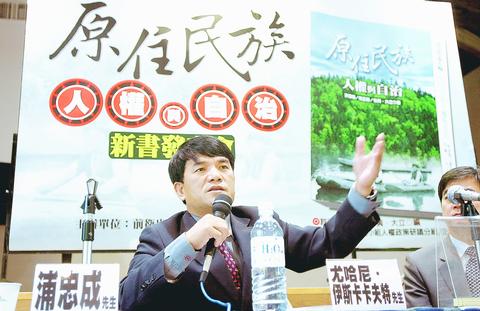Autonomy for Aboriginals is essential if indigenous groups are to survive, scholars and activists said yesterday.
The academics and activists yesterday used the launch of a new book on autonomy for Aboriginals to press the issue.

PHOTO: CHEN CHENG-CHANG, TAIPEI TIMES
They said that granting autonomy to Aboriginals would ensure the preservation of their cultures and resources -- and guarantee the survival of Aboriginal people.
The new book, Aboriginal Human Rights and Autonomy (原住民族人權與自治), is a collaborative effort by the Presidential Office's Human Rights Advisory Group, Aboriginal intellectuals, academic experts and members of the Council of Aboriginal Affairs.
The book also includes material on Aboriginal issues drawn from public hearings.
"Aboriginal autonomy is not a new issue," said Yohani Isqaqavut, a member of the Burun (
Yohani said that the request for autonomy was not extraordinary, as indigenous groups just want to have the freedoms they enjoyed in the past.
"Aboriginals and society at large need to understand that Aboriginals are not asking the government to `grant' them autonomy, but are merely asking for the return of what was stolen from them long ago," he said.
Yohani also said that while the formation of an Aboriginal autonomous region was an issue best tackled by Aboriginals, support and resources from the government would be essential.
"In the past, our people were taught to be defiant and fight government repression," Yohani said. "Now, with the support of the new administration, we hope to regain an identity, respect and self-governance that Aboriginals lost decades ago."
Aboriginal leaders singled out the policies of the KMT regime over the past five decades.
"During the martial law era, KMT policy erased much of the Aboriginal culture," said Buhsing Dali, president of the Yushan Theological Seminary.
For example, the KMT prohibited Aboriginals from speaking their mother-tongue in public.
In addition, the Aboriginal names of roads, tribes and mountains -- as well as people's names -- were all changed to Chinese.
Buhsing said that through a series of "modernization" reforms put forth by the KMT, many aspects of traditional Aboriginal life had been undermined.
"As a result, Aboriginal cultures have been marginalized," Buhsing said.
Yohani said that no one, "not even Aboriginals, is entitled to deny the existence of Aboriginals in our society."
After decades of work, Buhsing said, pro-autonomy activists are starting to taste the fruit of their labor.
"We are grateful that the new administration today is willing to hear us out and turn words into actions," Buhsing said.
He was referring to a public hearing hosted by the Presidential Office in March on the issue of Aboriginal native rights.
"We regard the choice of location for that public hearing as a sincere gesture from the new administration," Buhsing said. "It is very meaningful that it was held at the Presidential Office."
During last year's campaign, President Chen Shui-bian (陳水扁) pledged to work for the self-determination of the nation's Aboriginals.

The CIA has a message for Chinese government officials worried about their place in Chinese President Xi Jinping’s (習近平) government: Come work with us. The agency released two Mandarin-language videos on social media on Thursday inviting disgruntled officials to contact the CIA. The recruitment videos posted on YouTube and X racked up more than 5 million views combined in their first day. The outreach comes as CIA Director John Ratcliffe has vowed to boost the agency’s use of intelligence from human sources and its focus on China, which has recently targeted US officials with its own espionage operations. The videos are “aimed at

STEADFAST FRIEND: The bills encourage increased Taiwan-US engagement and address China’s distortion of UN Resolution 2758 to isolate Taiwan internationally The Presidential Office yesterday thanked the US House of Representatives for unanimously passing two Taiwan-related bills highlighting its solid support for Taiwan’s democracy and global participation, and for deepening bilateral relations. One of the bills, the Taiwan Assurance Implementation Act, requires the US Department of State to periodically review its guidelines for engagement with Taiwan, and report to the US Congress on the guidelines and plans to lift self-imposed limitations on US-Taiwan engagement. The other bill is the Taiwan International Solidarity Act, which clarifies that UN Resolution 2758 does not address the issue of the representation of Taiwan or its people in

US Indo-Pacific Commander Admiral Samuel Paparo on Friday expressed concern over the rate at which China is diversifying its military exercises, the Financial Times (FT) reported on Saturday. “The rates of change on the depth and breadth of their exercises is the one non-linear effect that I’ve seen in the last year that wakes me up at night or keeps me up at night,” Paparo was quoted by FT as saying while attending the annual Sedona Forum at the McCain Institute in Arizona. Paparo also expressed concern over the speed with which China was expanding its military. While the US

SHIFT: Taiwan’s better-than-expected first-quarter GDP and signs of weakness in the US have driven global capital back to emerging markets, the central bank head said The central bank yesterday blamed market speculation for the steep rise in the local currency, and urged exporters and financial institutions to stay calm and stop panic sell-offs to avoid hurting their own profitability. The nation’s top monetary policymaker said that it would step in, if necessary, to maintain order and stability in the foreign exchange market. The remarks came as the NT dollar yesterday closed up NT$0.919 to NT$30.145 against the US dollar in Taipei trading, after rising as high as NT$29.59 in intraday trading. The local currency has surged 5.85 percent against the greenback over the past two sessions, central